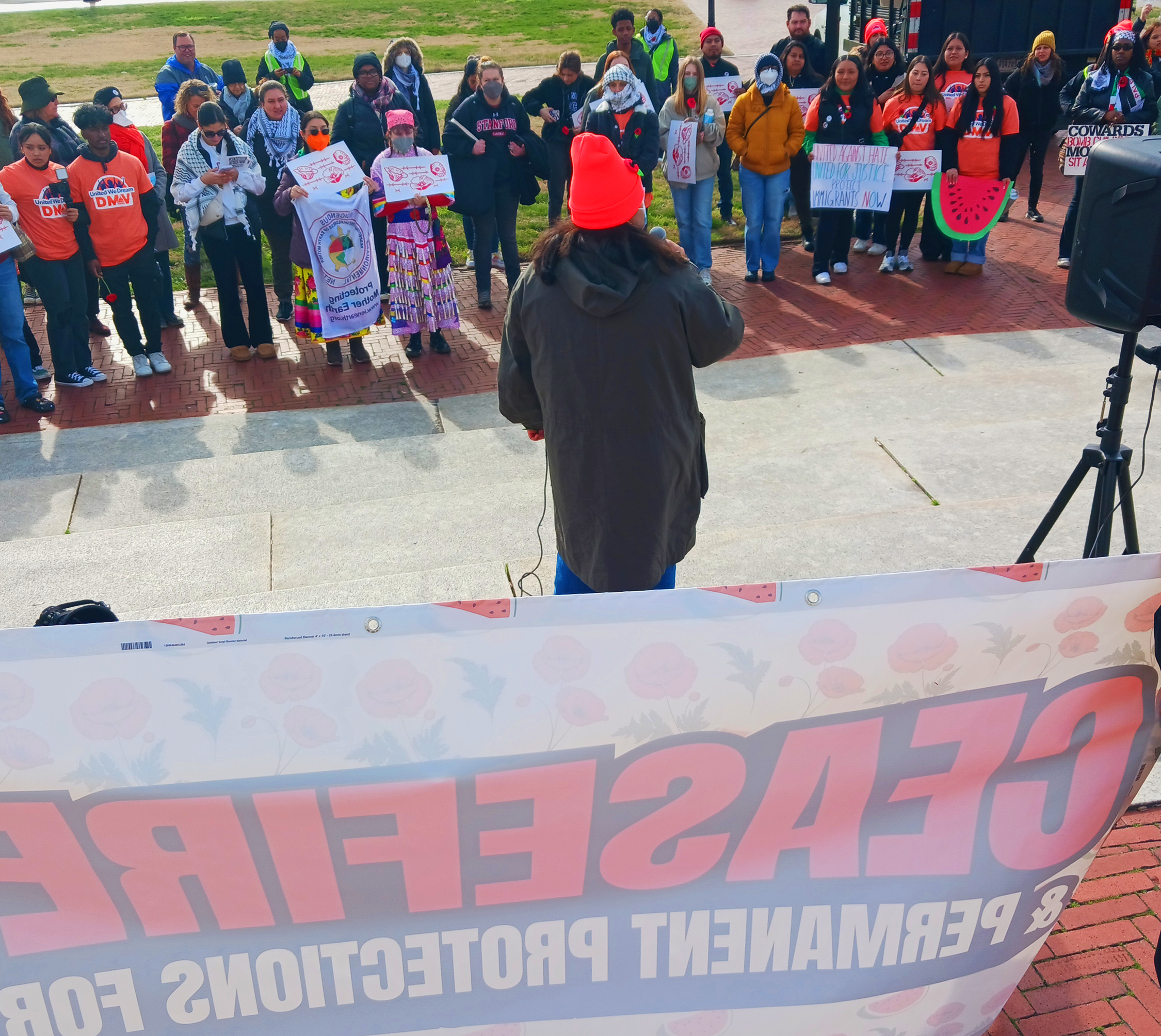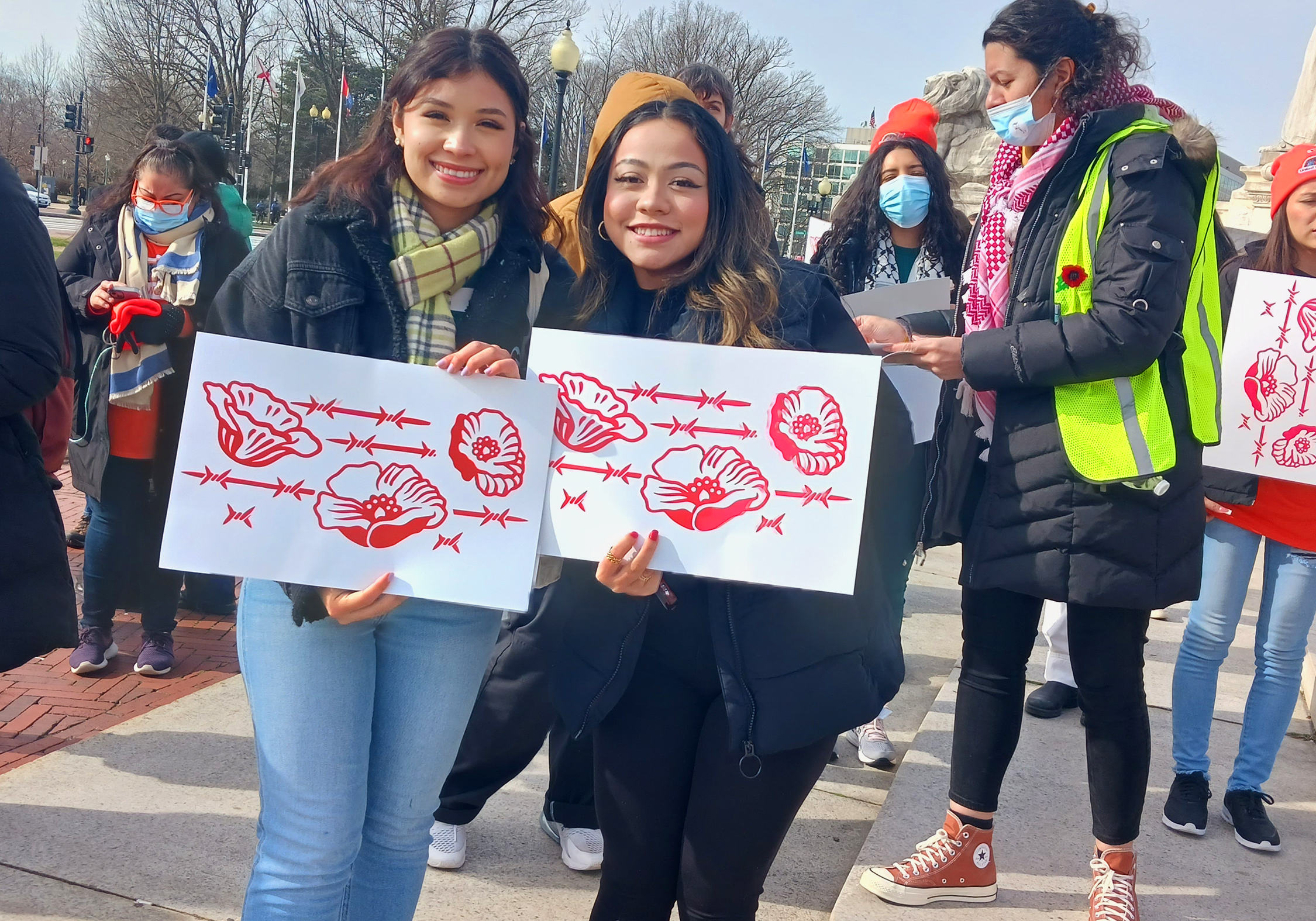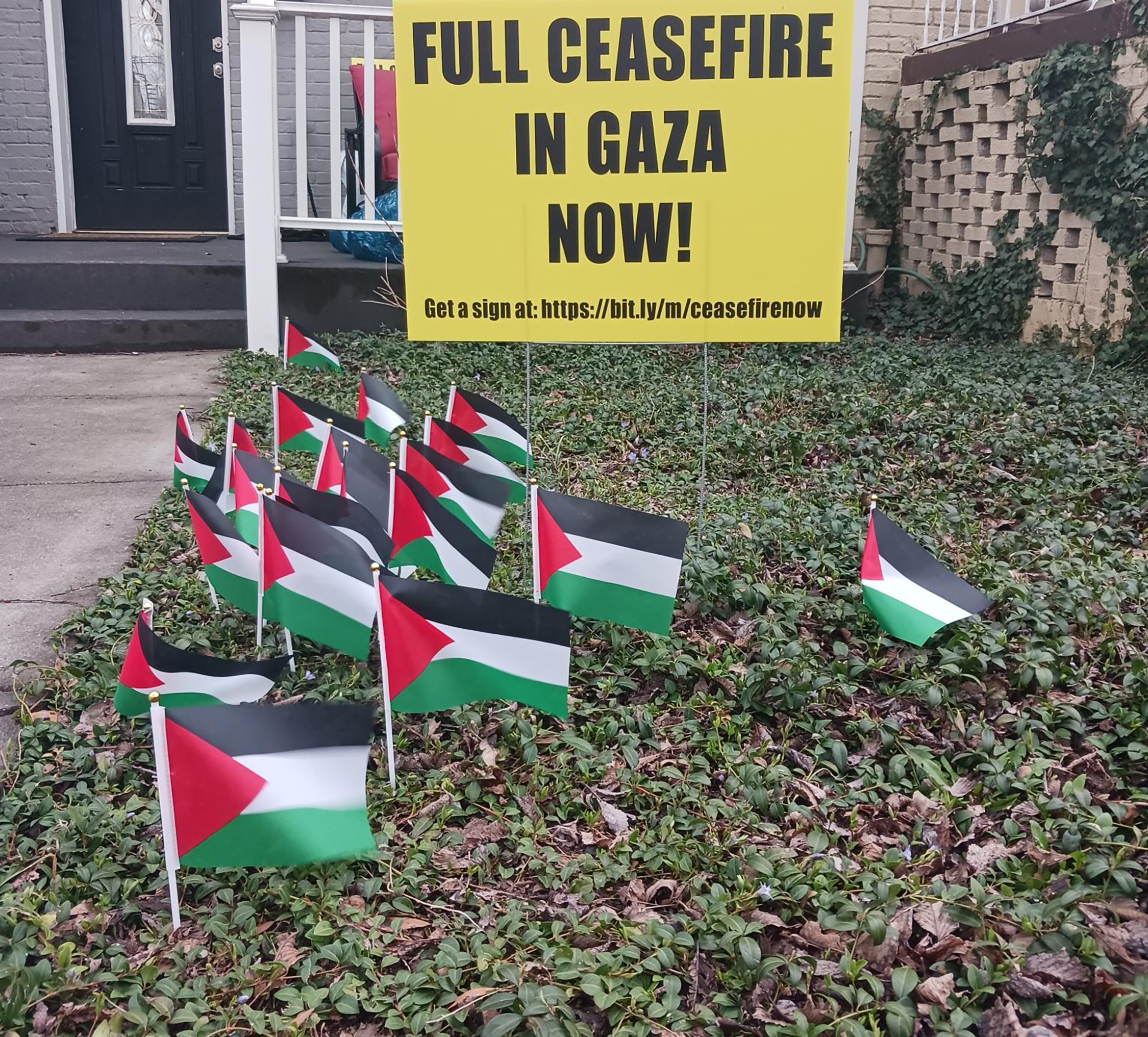
By Brittany McAlister
Trinity Times Correspondent
U.S. college students have been holding pro-Palestinian and pro-Israeli protests in response to the Israeli-Gaza war and while there haven’t been any visible signs of conflict on the Trinity Washington University campus, many students are opposing their school leaders under the radar.
Much of the debate at Trinity has been happening on an online forum chat group hosted by students, who have openly complained in that medium about how their professors and Trinity President Patricia McGuire have been discussing the conflict since Oct. 27, 2023, when Israel launched a broad ground offensive in Gaza following the Oct. 7 Hamas-led kidnapping and slaughter of Israeli citizens in Israel.
“Her and a few of my professors lack knowledge of what’s going on, but continue to speak on it,” one student wrote in the chatroom, referring to information about the bloody Oct. 7 attack in Israel McGuire posted on her blog Oct. 13 entitled “Agony and Evil in Israel and Gaza,” and from discussions Trinity professors have had in their classes.
Most Trinity students who have voiced their views on the war tend to adopt a pro-Palestine position.
Moreover, an increasing number of Black Americans perceive the struggle of Palestinians in the West Bank and Gaza through a lens akin to their own quest for racial equality and civil rights.
Though McGuire didn’t choose a side in the conflict in her blog post, she did condemn the Oct. 7 attack as “Heinous,” “Horrific,” Devastating,” and “Barbaric,” and further stated that “what Hamas did was utter terrorism, indefensible, and deserving of a strong response. Israel has every right to defend itself and its people. President Biden has pledged the full support of the United States in supporting Israel’s right to self-defense, and he is right to do so.”
The blog enflamed many Trinity students who took their grievances to the chat group and expressed severe disappointment with the president’s words and associated them with a pro-Israel/anti-Palestinian stance, a charge McGuire believes is misinterpreted.
While fierce pro-Israel and pro-Palestinian protests have erupted on U.S. college campuses from Tulane University in New Orleans to Harvard in Boston, the Trinity campus has not been the stage for visible signs of political demonstrations on the war.

A select group of Trinity students have attended rallies staged in Washington and expressed their irritation that a university-wide email cautioning the community about traffic backups in the city didn’t mention the cause, which was for a scheduled pro-Palestinian protest.
“Did you all see this?” one of the students asked on the student chat forum. “She has sent zero pro-Palestine protest info., but sends this? She is just a face. She has no knowledge of anything at this point. I know it’s about road closures, but girl, you didn’t say anything about the Palestinian protests at all.”
Students in the chatroom said they wanted to hear more from university leaders about the conflict and were angered by any hint of a pro-Israel stance on the matter.
In fact, McGuire did host a “Campus Conversations” session on Zoom Oct. 19, 2023, and among the advertised topics on the agenda was a discussion of the war in Israel and Gaza and how Trinity can provide opportunities for learning and dialogue.
Trinity hosts a virtual “Campus Conversations” at least once a semester and students, faculty and staff are always invited.
McGuire opened the October “Campus Conversations” discussing her blog post, said she had heard some people were not pleased with what she wrote and told students, faculty, and staff that all opinions were welcomed in this forum.
Several students expressed their strong support for the Palestinian cause, which they insisted was too often overlooked in favor of Israel.
Historically, conflict between Israel and Palestine isn’t new, with frequent fighting happening since the Jewish state was created in the late 1940s.
Other than the “Campus Conversations” session and a lengthy comment posted on McGuire’s Oct. 13 blog, the university president said she hasn’t heard from students about the war in Gaza.
Though McGuire told Trinity Times that she still holds firm that Hamas is a terrorist group, that it was clearly the aggressor on Oct. 7 and that Israel has the right to defend itself, she is horrified by the resulting war.
“Sadly, Israel’s defense has disproportionately killed and wounded tens of thousands of Palestinians who werenot part of the Hamas terrorism,” she said. “Israel is wrong in the scope and intensity of its response, the country should have focused more specifically on Hamas.”
Several Trinity students, some professors, and some international leaders are calling the war in Gaza a genocide on the Palestinians, even though the United Nations has yet embraced that term.
“Israel’s response is horrific, but I will not use the terms ‘genocide’ or ‘ethnic cleansing’ since those mean something else,” McGuire said. “Jews were subjected to genocide and ethnic cleansing during the Holocaust.What Israel is doing in Gaza is an outrageously over-the-top response to the Hamas attack on Israelis on Oct. 7. Most responsible leaders in the civilized world recognize that Israel’s response is just hideous and should end immediately.”
There is growing frustration among U.S. college students, scholars, politicians, Black voters, and U.S. Muslims about President Joe Biden’s continued support of Israel as the war continues and a reported 30,000 Palestinians have died as a result of the conflict, according to Gaza’s health authorities.
Though the Biden administration has been engaging in a diplomatic dance to influence a cease fire in Gaza, the U.S. continues to supply weapons to Israel, which then are used on the Palestinians.
Moreover, U.S. college student activists have been taking up the “Free Palestine” cause even before the current war.
The Palestinian cause — and opposition not solely to Israeli policies but to the nation’s fundamental existence as a Jewish homeland — has transitioned from the periphery of student activism to emerge as one of the most vigorous political movements across American college campuses.
“Advocacy is difficult regardless of the circumstances in my opinion,” said Beylul Russom, an adjunct professor of Communications at Trinity. “Especially as it pertains to the Gaza war. In many ways most of uswill feel helpless and deeply desiring to separate ourselves from the governmental stances our country is taking in this situation. However, in the university setting, there are a couple of approaches that can be taken on and off campus.”
On campus, as a faculty member, Russom said she can make an effort to utilize such conflicts as topics of discussion in her classes, stressing that it’s important to not shape what students think but guide them through critical analysis of a given topic or ideology.
Russom does consider the situation in Gaza as genocide, a view shared by many of her students and U.S. college activists for the Palestinian cause.
“I believe the Gaza war is both genocide and ethnic cleansing as both share the same desired goal in the elimination of Palestinian people,” she told Trinity Times. “Of course, the methods to the mass killings bring distinctions between the two in which ethnic cleansing would be the worse of two evils.
“I believe, however, the genocide of Palestinians has been occurring for decades with thousands of Palestinians being terrorized from their native lands and either pushed out or killed off through Israeliresettlement programs,” Russom said. “October 2023 was a tipping point.”
The war in Gaza has enraged college-aged, Muslim and Black voters, many of whom have cast protest “uncommitted” ballots in key state Democratic primaries to send a message to President Biden of their displeasure of his handling of the conflict.
The political and diplomatic aspects of the international reaction to the war in Gaza is complex and nuanced, and Russom said there is an opportunity in the classroom to do extensive research, to fact check, andencourage discussion on the matter.
“To make some impact on a conflict requires first the acknowledgement of said conflict,” she said. “Off campus, we can recirculate articles, images, and organizations that are supporting peace resolutions. But themost important thing to remember about advocacy is that to make a global change requires a global effort. One individual cannot change a country on their own. We are not in positions of power to impact change directly, but we can empower our community by spreading knowledge and bringing awareness.
“As members of academia,” Russom said, “we are in a unique position to educate others and utilize our strengths and critical thinking skills to dispel misinformation.”
Though no protests have occurred on Trinity’s campus, many of the university’s students have participated in the pro-Palestinian rallies held in Washington since Oct. 27.
“I am hopeful that with enough attention from the rest of the world, there will be a peace negotiation,” said Trinity student Andrea Montano, a political science major. “I think what is happening right now will eventuallylead to that because many people from this generation are pushing for peace and exposing the cruelties and human rights violations Israel is committing.”
Higher education campuses have historically been centers for political exchange and policy debate, and Trinity student Ingrid Nunez, a criminal justice major, would like to see the Trinity community more visibly engaged in the Gaza war.
“Trinity can start by holding meetings or starting a group specifically for those who really want to gather around and talk about this crisis,” Nunez told Trinity Times. “By doing so, Trinity can inspire other colleges or universities to also speak up.”

Open and visible discussion and debate about the war in Gaza has been encouraged by McGuire, who said she doesn’t regret any of her past statements about the conflict, and for as much criticism as she’s heard, she’s also received grateful messages from Jewish students, faculty and staff.
“This is an evolving international crisis in which dialogue and ongoing attention to the events is essential tounderstanding,” McGuire said. “The fact of criticism is healthy; the debate enlarges all of our understanding ofthe many dimensions of the crisis.”
Rampant antisemitism and Islamophobia in the U.S. unleashed by the Gaza war needs to be confronted and addressed, McGuire said.
“Some of the criticism of Israel has given tacit approval to antisemitism, and on some college campuses, Jewish students have been subjected to extreme hatred as a result,” she said. “We will never achieve a morejust, peaceful society if we continue to indulge ethnic, racial and religious hatred. We must work to eradicateall forms of hatred that are the wellsprings of the horrors we see in Gaza and so many places.”
While McGuire said she is grateful to students for expressing their points of view and respects what they have had to say, their points of view do not diminish other points of view.
“As members of the academic community, it’s really important for us to lift up the debate and points ofdisagreement without feeling that someone has to ‘win’ while someone else is diminished,” McGuire said. “We are all seeking truth, and public expressions of different opinions are part of the learning process.”
This article is awesomely described!
“I believe, however, the genocide of Palestinians has been occurring for decades with thousands of Palestinians being terrorized from their native lands and either pushed out or killed off through Israeliresettlement programs,” Russom said. “October 2023 was a tipping point.”
This paragraph explains a lot and I hope more people read your article. Thank you!